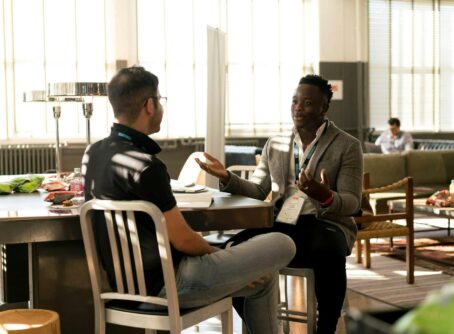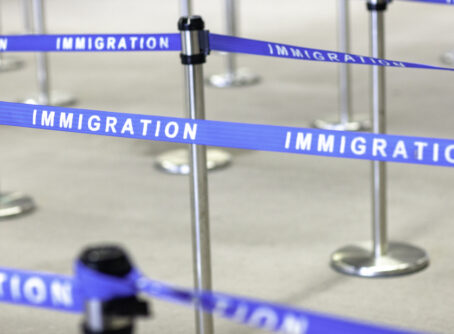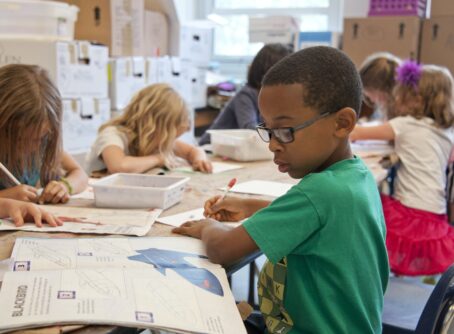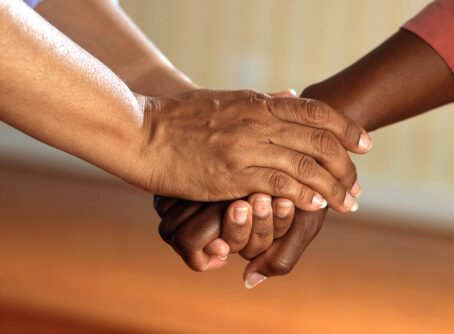
Do you know your neighbors? Do you really know them? If you were asked to write down the names of the people who live on every side of you, how many of them would you be able to name? This is the question, posed during a church service, that sparked Mark Ferguson’s journey to get to know his neighbors better and to think beyond ordinary definitions of what it means to love one’s neighbor as oneself.
Ferguson joked that in response to this sermon, he started to get to know his neighbors by being “that weird neighbor” who was always hanging out and trying to learn others’ names. But after a while, his vision of “who” was his neighbor began to expand. That pivotal sermon prompted Ferguson not only to get to know the people who lived right next to him, but to also find a way to get to know his neighbors experiencing homelessness.
A few years later, he is now the CEO of Givr, a small non-profit that seeks to help people love their neighbors experiencing homelessness. Now, when people ask him how they can get to know their neighbors he says, “The first step of being a good neighbor is knowing their name.”
Givr works to honor human dignity by partnering with a non-profit called Come as You Are Cville to hire those experiencing homelessness in Charlottesville, Virginia, and give them the opportunity to engage in prosocial work by packaging care kits for the larger homeless community. Givr’s subscribers receive a couple care packages each month which they then give to those they meet as they commute to and from work and other activities. As Givr subscribers give away these packages, they learn the names of their neighbors experiencing homelessness and start to build relationships.
The reality for many across America, especially in urban areas, is that we hardly know the names of those who live right next door to us, let alone the names of those experiencing homelessness in our towns, or the names of those who live in different neighborhoods or income brackets. The most recent statistics available show that approximately 580,446 people are experiencing homelessness in America. Those who are experiencing chronic homelessness — people who have been continuously homeless for at least a year or have experienced homelessness at least three times for about a year — make up 27 percent of the overall homeless population. The reality is that these numbers may be even higher now, but due to pauses in data collection and challenges counting the true number of people experiencing homelessness during the pandemic, we do not have accurate numbers for the past two years.
Additionally, the risk and length of experienced homelessness is significantly tied to the person’s gender, race, and ethnicity. Marginalized groups are the most impacted as they experience higher unemployment rates, lower income, less access to healthcare and higher incarceration rates. Homeless programs and systems are able to provide shelters to only 65 percent of the American homeless population, often leaving individuals and unaccompanied youth unsheltered. Our society cannot flourish when neighbors in our communities are experiencing injustice.
We know it is not right that some people are relegated to the corners of society and denied even the basic dignity of eye contact let alone the resources they need to flourish, but what does justice require of us as Christian citizens? And what does justice require of the government and civil society? We believe that we cannot know true flourishing until we see our neighbors flourish too.
PUBLIC JUSTICE PERSPECTIVE
A vision of a just society requires that government and civil society work together to ensure the wellbeing of everyone — especially those experiencing homelessness — in our communities. The Center for Public Justice’s Guideline on Government states that the government “bears responsibility to legislate, enforce, and adjudicate public laws for the safety, welfare, and public order of everyone within its jurisdiction. The guiding norm, or principle, for such laws is public justice.”
Considering this guideline, the government ought to implement policies to support our neighbors experiencing homelessness in order to provide for the safety, welfare, and public order of everyone in our communities. One way the U.S. government already does this is through the U.S. Department of Housing and Urban Development (HUD). As Jordan Bellamy wrote in her 2018 Student-Faculty Prize Report (now called the Hatfield Prize),
“HUD and affiliated government agencies such as Public Housing Authorities administer the majority of public assistance, often in partnership with other civil society institutions including churches, businesses, and nonprofits. Public Housing Authorities receive federal funding from HUD to administer public housing vouchers and housing choice vouchers and manage public housing units.”
These housing choice vouchers (HCVs) are often referred to as Section 8 housing and provide an important safety net for those who do not have reliable or affordable housing. Through offering HCV’s, the government supports the dignity of those receiving them by allowing them to choose their own housing, and also promotes well-being and flourishing by ensuring everyone has a place to live. There is still more that could be done to strengthen these programs and another article in this series will explore how Housing First policies can be tailored to address the needs of the chronically homeless community.
ROLE OF CIVIL SOCIETY
While government has an important role to play in addressing the needs of our neighbors experiencing homelessness, civil society plays an important role too. Some organizations, like Givr, seek to meet the immediate social and physical needs of our neighbors experiencing homelessness, while other organizations, Like Marian House in Baltimore, work to provide holistic support and connect women who are housing insecure with social services they need.
The model that Marian House uses in particular serves as an example of a government partnership with nonprofits for the flourishing of our neighbors. While Marian House uses federal dollars to run its permanent, affordable housing programs, it also runs a transitional housing program that provides a wide range of wraparound social services for previously incarcerated women. These services range from group therapy and individual therapy, to substance use counseling and professional development classes. According to Psalms Rojas, the Chief Administrative Officer of Marian House, one of their main goals is to empower women as they heal and learn to take care of themselves, their families, and their friends.
Communities like Marian House are well-equipped to serve our neighbors experiencing homelessness, especially previously incarcerated women. Rojas reflected on the fact that when most people go to work, they go to a workplace. “I work in someone’s house, essentially,” she reflected, adding, “This is home for them. We really get to see them more deeply and more intimately than if I was in an outpatient setting.” It is good and helpful for this more personal work to be done through nonprofit organizations, with the support of government funding.
A RESPONSE FOR CHRISTIAN CITIZENS
Our neighbors are not simply those who live in the houses right next to us. They are the people we pass every day on our morning commute; they are our cubicle buddies, the cars that cut us off on the interstate, our barista, our bus driver, and our neighbor standing on the corner of the street asking for help.
If we are not careful — and we think many of us are not — we will misidentify who our neighbors are and skate past opportunities to love our neighbors as ourselves. On the other hand, maybe we need the help of our neighbors, but they are blind to our needs.
In this day and age it is easy to fall victim to the epidemic of hurry — to associate busyness with productivity. Yet studies have shown that once an individual hits 50 hours of work, productivity is likely to decline. In his book, “The Ruthless Elimination of Hurry,” Pastor John Mark Comer writes that our society’s cultural norm that values pathological busyness has cut off our connection with God, others, and our own souls.
Hurry kills relationships because it impedes our ability to see others with human dignity. Love takes time. Entering into meaningful relationships also takes time. Yet, the key to a present self in a relationship with your neighbors is not more time, because life often does not give us more time. Rather, it is a reorientation of our attitude, in the time we have, to first listen and understand our neighbors so that rightful and dignified help can be given.
Although we experience a culture of over scheduling and busy-ness here in Washington, D.C., we believe this experience is not unique to us, but shared by many across the country. The rest of the articles in this series seek to overcome those barriers built by hurrying in order to ask questions like, how do our neighbors become our neighbors? And how can we advocate for just housing policies in our communities? These articles will look at the particular challenges faced by homeless men, zoning laws and multi-family housing. We may think that we picked our own neighbors, but there are many factors that play into our housing decisions.
As Christian citizens, we ought to think more about what it means to be a neighbor in the communities — physical and online — where we live and interact as well as what it means to be a neighbor outside of our typical social circles.
Want to get involved?
1. Sign up to receive Shared Justice’s monthly newsletter and stay up to date on the latest content, resources, and highlights.
2. Write for us! To learn more about writing for Shared Justice, email emily.fromke@cpjustice.org.
3. Form a Political Discipleship group to practice meaningful political engagement in your community. The Center for Public Justice’s Political Discipleship is a guide for active Christian citizenship, designed to empower people with skills and tools to shape policy and address inequality and injustice in their communities. To learn more about starting a group, visit our website or contact emily.fromke@cpjustice.org






